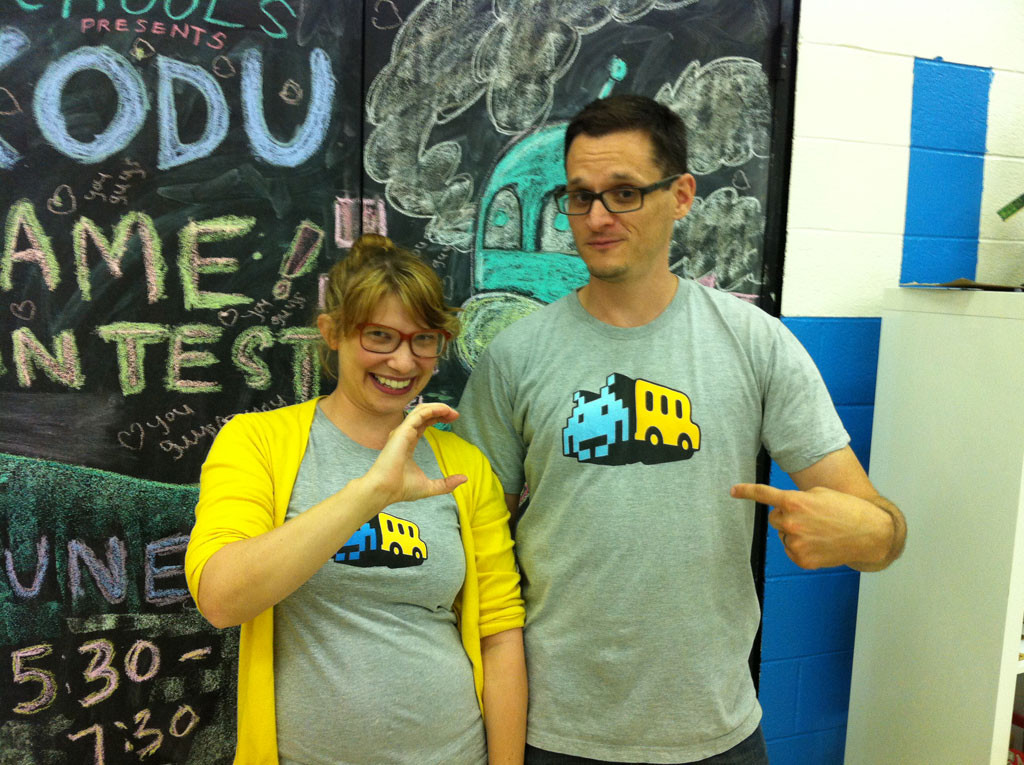Taiven Rumph, a 15-year-old rising junior at Digital Harbor High School, needed two weeks to put together Purelife Echo, an aerial combat video game where players use missiles to down enemy bogeys.
“I like [coding games],” said Rumph, who runs his own web development side business and is just beginning to learn JavaScript. “It’s limitless—you can pretty much do anything.”
Rumph was one of six students presenting games Wednesday night at the Digital Harbor Tech Center in Federal Hill. For four weeks, students at Digital Harbor High School have been creating their own video games using Microsoft‘s Kodu Game Lab.

Digital Harbor High School student Taiven Rumph with his game, Purelife Echo (named after the popular water cooler jug). (Photo by Andrew Zaleski)
They’ve been programming games thanks to instruction from Code in the Schools, a two-month-old nonprofit headed by husband-wife team Michael and Gretchen LeGrand. Essentially, it’s Baltimore’s version of Code.org, the nationwide initiative demanding that all students, in every school, have the opportunity to learn computer coding. (With big backing from the likes of Bill Gates and Mark Zuckerberg, and endorsed, naturally, by the Black Eyed Peas’ will.i.am.)
That, really, is the heart of Code in the Schools: teaching Baltimore city school students an entirely new language, one that—if trends continue—will be more useful for them than a secondary verbal language.

Before the event’s start: students at tables ready to present their video games. (Photo by Andrew Zaleski)
“Anybody can learn to code,” said Michael LeGrand, himself a video game programmer and a former employee of both Big Huge Games and Zynga East prior to each meeting its respective sorry end. “It starts with little, tiny projects.”
Little, tiny projects like video games programmed in Kodu or Small Basic, which students were using the first four weeks of a total eight-week curriculum program. Over time, the Digital Harbor High students learned about variables, loops and subroutines, all the building blocks of a fully functional computer program.
As for Code in the Schools, it heads to the tech center associated with Liberty Elementary School this summer to bring a slightly modified version of its gaming and coding courses to Liberty students in third through sixth grade.
“It seems like there’s a real need for this in Baltimore,” said Gretchen LeGrand. “It’s a good thing for this area.”
Before you go...
Please consider supporting Technical.ly to keep our independent journalism strong. Unlike most business-focused media outlets, we don’t have a paywall. Instead, we count on your personal and organizational support.
Join our growing Slack community
Join 5,000 tech professionals and entrepreneurs in our community Slack today!

The person charged in the UnitedHealthcare CEO shooting had a ton of tech connections

From rejection to innovation: How I built a tool to beat AI hiring algorithms at their own game

Where are the country’s most vibrant tech and startup communities?

